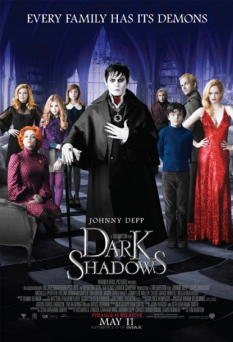By Michael Scoular (The Cascade) – Email
Print Edition: May 23, 2012
 A typical Burton outsider rides in to the tune of “Nights In White Satin” by The Moody Blues, adopts a pseudonym based off a Victoria, BC, tourism poster (seriously) and attempts to integrate into a practiced, ordered world of material values. Like most of Tim Burton’s work, Dark Shadows is a curated-like object of Burton’s past inclinations and present aesthetic desires. However, the opening relationships, involving Bella Heathcote’s Victoria, Michelle Pfeiffer’s matriarch Elizabeth and Chloe Moretz’s teenager Carolyn, for a moment resembles the Burton responsible for tragic characters, comic pain and open frames that observe people free/not free to move, rather than calculated brand quirk. And then Johnny Depp rises from the dead.
A typical Burton outsider rides in to the tune of “Nights In White Satin” by The Moody Blues, adopts a pseudonym based off a Victoria, BC, tourism poster (seriously) and attempts to integrate into a practiced, ordered world of material values. Like most of Tim Burton’s work, Dark Shadows is a curated-like object of Burton’s past inclinations and present aesthetic desires. However, the opening relationships, involving Bella Heathcote’s Victoria, Michelle Pfeiffer’s matriarch Elizabeth and Chloe Moretz’s teenager Carolyn, for a moment resembles the Burton responsible for tragic characters, comic pain and open frames that observe people free/not free to move, rather than calculated brand quirk. And then Johnny Depp rises from the dead.
Depp’s collaboration with Tim Burton as wholly defined, in a derisive way, by the makeup masks and phony accents he adopts, isn’t entirely fair – for the best of their efforts (Edward Scissorhands, Sweeney Todd) are similarly powdered and vocally divergent from the real. If there is a dividing line through Burton’s filmography—and with it Depp’s performances—it might be what they seek to find in the outlandish, and where they stand, whether inside or out, in relation to that outlandishness.
Dark Shadows, though not as horrid as, say, Alice in Wonderland, sees Depp similarly standing outside the material, not as an outsider/loner character, but as the ultimate insider – in on the dated, vampiric and innuendo-laced jokes even as he feigns ignorance, and in on the idea that this is a continuation of the Depp-Burton persona, in a way divergent from the rest of the cast. Heathcote, Pfeiffer and Moretz are shifted to the sidelines, bystanders in what was up to a point their own movie.
What follows is a variation on Burton’s Corpse Bride, with Eva Green’s Angelique assuming the role of the otherworldly unlucky lover. Where Depp’s measured, amused with himself, slow-witted diction threatens to kill the picture, Green’s jealousy, all loopy grins and bladed arm gestures, rises above the trivial business deal/rival plotting of the screenplay, which also ignores the class distinction that initially separated the pair, favouring turning her character into just another obsessive scorned manhandler. There’s some portentous dialogue about eternal love, life and immortality, and the importance of family, but it’s around the edges as dialogue or voiceover, never threatening to creep into the substance of the film. This is Burton firmly in “don’t take me too seriously” mode.
Which isn’t to say that Burton’s visual work and choice of collaborators isn’t on display as it tends to be. Moments of visual splendour and acuity come and go: an out of focus dance, an emptied bag, a 360-degree turn that’s almost half as charged with eroticism as a similar shot in Terence Davies’ The Deep Blue Sea, and the typical toeing of the line between practical and digital effects that makes people regard “A Tim Burton Film” as one bursting with “imagination.”
When one character replies to a line about how magnificent the family’s mansion looks with everyday resignation, it’s intended to be funny, but it’s close to the truth considering how Burton’s movies have progressed. Referencing themselves with diminishing returns, rarely stepping outside of a comfort zone, they’re often as hermetic and hollow as the state of the family in Dark Shadows. Burton’s continued hiding of his best tendencies (the potential of the opening, Christopher Lee again confined to a single scene, emotions sublimated into thin laughs – when the opposite shift is what he’s excelled at) isn’t maddening or disappointing. For Burton it’s typical.

